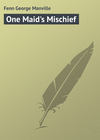Buch lesen: «One Maid's Mischief», Seite 26
“Well,” he said, laughing, “has the fit of anger passed away? If not I can wait.”
She did not answer, but stood gazing at him with a piteous look in her eyes – gazing so pleadingly that he sprang to his feet, a change coming over his countenance as he approached her.
Helen’s heart gave one great throb of joy, for she read now in his face the power she had over him still. He really loved her, and it was he who was the slave, not she, and she would yet be able to mould him to her will.
But not by anger and reproach: they would only weaken her position. She had found that he was one who might be moved by her woman’s grief and tears, and acting upon the impulse of the moment, she waited until he was close at hand, and then, before he could stay her, she sank upon her knees, to clasp his hands in hers, and gazing in his face, burst into a passionate flood of tears.
End of Volume Two
Volume Three – Chapter One.
Chumbley’s Idea
“Chumbley,” said Bertie Hilton, “your behaviour towards that woman was sickening – almost disgusting! How you could be even civil to her is more than I can understand!”
“Oh, I’m always civil to a woman,” drawled Chumbley. “See how affable I always was to Helen Perowne, who – ”
“Will you have the goodness to leave Miss Perowne’s name out of the conversation?” said Hilton, with asperity.
“Certainly, if you wish it, and substitute little Stuart’s name. See how civil I always was to her.”
“A merit certainly,” said Hilton, contemptuously. “Who could help being civil to so amiable and good a little body!”
“Here, hang it, Bertie, old man!” cried Chumbley, in mock alarm, “don’t monopolise all the nice women. It was Helen Perowne the other day. Now you seem dead on little Stuart!”
“Confound Helen Perowne!” muttered Hilton, bitterly.
“Just as you like; and confound the Inche Maida too – I shan’t! Sort of sympathetic pity for woman – weaker vessels, you know.”
“Weaker vessel?” laughed Hilton, scornfully; “what, our captor?”
“Well, she isn’t a bad sort of woman,” replied Chumbley.
“Not a bad sort of woman? Why, she’s a modern Jezebel – a Cleopatra – a Semiramis!”
“Think so?” said Chumbley, quietly.
“Think so? Of course! I’m getting terribly tired of this captivity! I must get away somehow. How many days have we been here?”
“Week,” said Chumbley, laconically.
“A week of weeks it seems to me,” said Hilton. “Horrible woman!”
“Well, I don’t know,” said Chumbley, “she seems to possess very great taste.”
“Taste? The savage!”
“Well, great taste in taking a fancy to you. I think you ought to be very proud.”
“Proud? I sicken with disgust! Pah! Don’t let’s talk about her, but try and make some plan to escape.”
“Well, yes, I suppose we must do that; but ’pon my word, old fellow, I don’t see how. I wish old Bolter were here.”
“I wish Mrs Bolter were here to tackle this dreadful woman!” laughed Hilton. “We men can’t manage her; but that clever, sharp little body would bring her to her senses. What do you want Bolter for?”
“Oh, he’d mix up a dose for the guards, and give it to them in their tea, or whatever they drink; then they’d go to sleep, and we could calmly walk back to the fort.”
“I wonder what Harley thinks of our absence?”
“Thinks we’re dead, probably, and reposing happily each of us in a crocodile sarcophagus. Well, Bertie, old man, what’s to be done? The Inche Maida has quite cut us it seems, and we’re all alone, I suppose. Come, what’s to be done to get us out of this plight? You’re quite right, old fellow; it is most absurd!”
“Absurd? It is disgraceful! I feel as if we were not men, but a couple of silly girls!”
“With beards,” said Chumbley.
“And now give me your advice.”
“Well, that’s soon done,” replied Chumbley. “I’ve quite made up my mind what advice I shall give.”
“Well, what?”
“Do you mean what shall we do?”
“Yes; of course.”
“Nothing.”
Hilton uttered an ejaculation that was far from pious, and began to fume and fret, till Chumbley rose in his slow, cumbrous fashion, placed a cigar in his friend’s hand, and bade him smoke it.
“Look here, old fellow,” he said, quietly, “if we are to escape, it can only be when a chance offers itself; and if you will bring your profound wisdom to bear upon the matter, you will see that all we can do is to wait for that chance.”
“And until that chance comes we must put up with this wretched woman’s insults!”
“Yes, if you like to call them so; and I’d do it, old fellow, without getting into a bad temper and calling names, seeing – ”
“Seeing what?”
“That she tries to make up for her rather unladylike conduct by being very civil; while her cooking is good, the dinners excellent, and the breakfasts, the wines well chosen, and the cigars – there, did you ever smoke a better than that?”
“Oh, pish! Everyone can’t take things as quietly as you do, Chumb.”
“Poor fellows, no,” said the latter, with a satisfied air. “It’s the only quality I possess of which I am really proud. You see it makes me perfectly well suited for this climate, for no troubles or worries ever put me in a perspiration. I wish, though, we had a chess-board and men.”
“Chess-board! men!” retorted Hilton, laughing, in a half-amused, half-vexed tone; “who in the world could ever think of playing chess! Really, Chumbley, I believe you are quite happy and contented.”
“Well, not so bad, dear boy – not so bad now the novelty and the unpleasantly of the affair have worn off. You see, a fellow has only so long to live. Well, isn’t it a pity to spoil any of that time by making yourself miserable if you can help it? Take my advice and behave as young Jacob Faithful suggested, ‘Take it coolly;’ and as the sailor in another story I once read said, ‘if you can’t take it coolly, soldier, take it as coolly as you can.’”
Hilton bit the end of his cigar and then bit his lips; lay back thinking of Helen and then of Grey Stuart, the latter obtaining the larger portion of his thoughts.
As for Chumbley, he lay back on his divan and smoked, and thought it was very tiresome to be detained there, but granted that it was better than being detained in hospital from wounds or sickness; and as time wore on, Hilton, removed from the cares and anxieties of being one of Helen’s lovers, settled down more and more into an imitation of his friend’s coolness, his common-sense teaching him that Chumbley was right, and that his best chance of escaping was by waiting for his opportunity – whenever that opportunity should come.
They had not seen anything of the Princess for some days, for she had evidently left them to cool down; but they had been admirably treated, and had grown a little less impatient of their prison, when one day a Malay servant entered their room, and with the most profound respect announced that the Inche Maida awaited the English chiefs in another room.
“Well, that’s not such bad treatment of prisoners, if it don’t mean a polite summons to execution. You first, old fellow; I’m only here as your confidential man.”
As he spoke, Chumbley rose slowly, left his hookah, and prepared to follow the servant; while Hilton frowned, declared that it was all very ridiculous, but smoothing his countenance, he followed the Malay, and was ushered by him into a similar room to that which they had left, to find dinner laid out in a by no means untempting style, the Malay fashion being largely supplemented by additions that the Princess had not been slow to copy from her English friends.
The Inche Maida was elegantly dressed, as Chumbley said, like her table, for her costume was as much European as Malayan, her long sweeping robe, and the delicate lace cap that rested upon her magnificent black hair, having a decidedly Parisian look, while her scarf was the simple sarong of her country, glowing with bright colours.
She smiled as they entered, but her demeanour was full of dignity, as she offered Hilton her hand, that he might lead her to the table.
Hilton drew himself up and was evidently about to refuse. The next moment he relented, and took a step forward, but he was too late to pay his hostess the compliment she asked, for she had turned to Chumbley, who held out his arm and led her to the head of the table, retiring afterwards to the foot, and facing her, while Hilton took the place upon the Princess’s right.
Perfectly unaware of Helen Perowne’s position, the two prisoners, under the genial influences of a good dinner and unexceptionable wine, while granting that their situation was perfectly absurd, were ready to acknowledge that after all it would be nonsense to do otherwise than accept it, make the best of it, and refuse to be angry about a foolish woman’s freak.
“I won’t be disagreeable any more,” thought Hilton, “but take things as they come, and be off at the first opportunity.”
“’Pon my word,” thought Chumbley, “this is better than that hot room at the fort. One always seems to be swallowing hot sunshine like melted butter with everything there one eats.”
The result was that Hilton forgot all about Helen Perowne for the time, and found himself comparing Grey Stuart with the Inche Maida as the two opposite poles of womanly beauty – the acme of the dark, and the acme of the fair. But his thoughts were to a great extent turned from the ladies to the dinner, and following Chumbley’s example, he ate heartily, drank pretty liberally of the wine – to drown care, he said – and by the time that the dessert was commenced he had concluded that life would after all be bearable without the society of Helen Perowne, who was, he told himself, a contemptible coquette.
He recanted from that declaration soon afterwards, the terms being, he thought, too hard; and then he fell into a state of wonderment at his contented frame of mind.
“I shall begin to think soon that the wound is after all not very deep.”
“Your friend seems to be getting resigned to his lot,” said the Princess, in a low voice to Chumbley, as, after dinner, they sat by the open window with a little table covered with fruit by their side, Hilton having kept his place.
“Yes, I suppose so,” said Chumbley, thoughtfully; and then, to turn the conversation into another channel, “How do you manage to get such good claret here?”
“Oh,” she said, laughing, “I am able to get most things here to help out the wants of our country. It is easy to have such things from Singapore. You like it?”
“It is delicious.”
“I am glad,” she said, with a satisfied smile. “I reserve it for my best friends.”
“Then why give it to us, your prisoners – and enemies?” said Chumbley, sharply.
“I was trying to show you that you were my friends, and not my enemies,” said the Princess, quietly.
“But you treat us like prisoners, Princess.”
“Only for your good. You shall both be free and lords of the place whenever you will.”
“But, my dear madam,” said Hilton, from his place by the larger table, “this is the nineteenth century – Chumbley, a little more claret? You seize us as a baron might have seized people three or four hundred years ago, and yet you treat us as an English lady would her guests.”
“It is what I have tried to do – this treatment,” she said, simply. Then with spirit, “What is it to me what people did a long while back? I hope, Mr Chumbley, you are satisfied.”
“With my dinner?” said the latter. “Yes, perfectly, for my part. It only wants a cup of coffee.”
“Not poisoned?” said the Princess, with a laughing, malicious look at her guest, as she thus recalled to him his suspicions at the fête.
As she spoke she clapped her hands, and coffee was brought in little silver cups upon a silver tray.
“Hilton, old man,” said Chumbley, as he took and liberally sugared a cup of coffee, smiling at the Inche Maida as he spoke.
“Well?” said his companion in misfortune.
“I have quite made up my mind, as I before hinted, not to knock the feathers off my noble breast against the bars of my cage.”
The Princess looked puzzled.
“Pshaw!” ejaculated Hilton; “don’t be absurd.”
“Why not? If to be patient in our present awkward position is being absurd. Won’t you take coffee, Princess?”
She shook her head, but altered her mind directly.
“Yes,” she said; and she took the cup Chumbley offered with a smile, while as he provided himself with a second, he nodded and said to himself:
“That’s very ladylike; so that we should not feel suspicious, I presume.”
“Ask her how long she means to keep on with this theatrical folly,” said Hilton, in a low voice to his friend – in French.
“What does he say?” cried the Princess, quickly. “He asks if you are still in earnest about keeping us prisoners,” said Chumbley. “If you are serious.”
“Earnest? Serious?” she replied, with her eyes flashing. “Should I have taken such a step as this, and risked offending your people, if I were not serious? Suppose I let you go – what then?”
“If Hilton has his own way,” said Chumbley, laughing, “there will be an expedition to come and burn your place about your ears for abducting two of her Majesty’s subjects.”
“No, no – no, no!” cried the Inche Maida, with a negative motion of her hand. “You would not be so cowardly as to come and attack a weak woman; that is for the Malays to do. You English are too brave and strong. I am not afraid.”
“Well, I don’t know,” said Chumbley; “we might, you know.”
“Oh, no, I won’t believe it.”
“Well, perhaps not,” said Chumbley, drily; “but history has a few ugly little records of English doings here and there. Do you know, madam, that you have given us an excellent excuse to pay you a peculiar visit?”
“What! to come and attack and destroy my home – to kill my people?” cried the Princess, excitedly. “You could not – you dare not. But I am safe. I shall not let you go; and as to my other enemies, in a short time you will both be reconciled to your lot, and you will say, ‘Let me stop and defend you.’”
“Hope told a flattering tale,” muttered Chumbley, as he saw the Princess watching Hilton as she spoke; but his distant mien and contemptuous looks so annoyed her that she turned from him angrily and addressed herself to his friend, as if for him to speak.
“Well,” said the latter, coolly, “I am an Englishman, and I like fair play, so I shall speak out. Look here; you know, Princess, it won’t do.”
“What do I know that will not do?” she said, in a puzzled way.
“Why, this foolish kidnapping business of yours; and I frankly tell you that, much as we shall regret leaving such charming quarters, if you only leave the birds’ cage door open for a moment we shall pop out and fly away.”
“I do not quite know what you mean about your birds in cages and your kidnapping,” said the Princess, haughtily; “but I suppose you mean that you will go.”
“Exactly,” said Chumbley, coolly.
“Then,” said the Princess, “I should have thought, for the favours I offer you – the great position and brilliant prospects – you would be grateful now you have had time to reflect, instead of treating me with disdain.”
“Well,” replied Chumbley, in his dry way, “that’s the nature of the English animal.”
“Talk sensibly,” said Hilton, in French; “why do you go on in that flippant way – why do you keep on arguing with her?”
“Because you will not,” retorted Chumbley, in the same language; “so hold your tongue. You see, Princess,” he continued, “you don’t understand the British nature, and this is how it is. If we fellows could not get those positions you offer, we might make a struggle for them; but as you offer them, and tell us we must have them, you set all our bristles erect, and we vow we will not have them at any price. No: my dear madam, you have gone the wrong way to work, and it will not do.”
The Inche Maida recoiled, as if the obstacles she was encountering stung her to the quick. She had evidently been under the impression that her patience and the treatment to which she had subjected her prisoners would have had a different effect, whereas they were as disdainful and obstinate as ever.
“You will think better of this,” she cried, impatiently.
Hilton made a sign as if to negative her words.
“Then if you reject kindness I shall try harshness,” she cried, her dark eyes flashing as she spoke. “I am Princess here, and my slaves obey me. I will have you starved into submission.”
Hilton smiled.
“Tell her she doesn’t know what an Englishman is, Chumbley,” he said, scornfully; “or no – be silent. Do not insult her, but treat her words with contempt.”
“He need not tell me,” said the Inche Maida, starting up and looking furious, as her eyes literally glittered in her rage. “I know, sir, what some Englishmen are – cold, proud, and haughty; men who think themselves almost gods in their conceit; while all who are not pale-faced like themselves they treat as dogs. Go to your prison, sir, and you shall learn that, proud and contemptuous as you are, there are others who can be as proud and cold.”
Chumbley was about to speak, but she waved him back.
“I brought you to my place that I might make you lord, master, and defender of my people. You thrust my favours from you. Let it be so. You shall not enjoy them. Stay as my prisoner till I please to free you, and then go back to your people, and beg, and fawn, and ask Helen Perowne to give you one of the smiles and sweet looks that she shares among so many.”
“I cannot bear this!” muttered Hilton, turning purple with rage.
“Hold your tongue! Don’t be an idiot,” growled Chumbley. “It is only a woman speaking.”
“Idiot!” exclaimed the Inche Maida, who just, caught the word. “She will not have you when you do go back, for by this time she is someone’s wife.”
“I do not believe you!” cried Hilton, angrily.
“You may,” she replied, with an angry gesture. “Now listen; I can be generous, but I can be hard as well, and I shall keep you my prisoner. I have brought you here, and I have done with you; I reject you, I would not listen to you now if you went upon your knees to me. I could not bear it, for I should know then it was only false. I say I shall keep you here for my own safety now; but though I have cast you off, I would not have your blood upon my hands. Remember, my people are charged to watch you, and they are Malays – faithful to the death. They would have been faithful to you, my lord, but you have refused. Now listen. My orders will be obeyed, as they were when I said I wish those two English chiefs brought here unhurt. Mind this, then; any attempt at escape will end in your falling by either kris or spear. Now go.”
She stood there looking very handsome and disdainful, pointing to the door, and the two officers had no alternative but to get up and walk towards the entry. Here, however, Chumbley paused, and turned back to where his imperious captor was standing with flashing eyes.
“We are too old friends to quarrel,” he said, good-humouredly. “Of course we shall try to escape, and we should do so if you had twice as many people to guard us. You have done a very foolish thing.”
“No!” she cried. “It was my will.”
“All the same a very foolish thing in bringing us here. Now, take my advice, as a friend; send us back at once.”
“No!” she said, fiercely.
“Yes; for your own sake.”
“No,” she cried, “leave me.”
“I promise you,” he continued, “that I will do all I can to hush the matter up. You will be reasonable. I should not like to see so brave and good a woman come to grief.”
“Go! Leave me!” she cried, fiercely. “I will not listen. I am a Malay Princess, and he has insulted and wronged me.”
“Well: there,” said Chumbley. “I’m going. Good-night.”
He held out his broad white hand, but the Inche Maida raised hers and struck at it angrily, her palm descending in Chumbley’s with a loud pat.
The young officer only smiled, bent his head, and turned to join Hilton in the other room.
As he reached the door, however, he heard a step, a hand was laid upon his arm, and a hoarse voice whispered:
“I am sorry – I was angry – forgive.”
Hilton had strode to the end of his prison, and thrown himself in a dissatisfied frame of mind upon the mats; the door had swung to, and there was a heavy curtain between, so that he did not hear what was said, nor see the hearty pressure of the hand that succeeded before Chumbley left the dining-room and joined his friend; while the Malay princess stood alone, with her hands clasped and her bosom heaving.
“I have been an idiot, and mad,” she muttered to herself. “He is right; I have done wrong, but I cannot go back now; I should lose all. I do not know these Englishmen. I thought he would have been proud and glad, and now he looks down upon me, and I feel so low – so crushed – that I could kill myself with rage. Ah! why do I not know more of their ways? I am but a poor, weak savage still, and I show my temper like a child.”
She walked wearily to the window, and stood with her broad forehead leaning against the bars, and for quite an hour neither of her women dared to approach her.
“Well, old fellow, feel any better for your dinner?” said Chumbley, heartily, as he strode up to the divan.
“Dinner? No. Hang the woman; how dare she insult us like that?” chafed Hilton. “As if there were anything between Helen Perowne now and me.”
“It was rather warm upon you, certainly,” said Chumbley; “but she was wild, and you were not above a few bitter repartees.”
“Bitter? Why, you are taking the Jezebel’s part!”
“Come, come, come, don’t call ugly names,” said Chumbley, sturdily.
“No name is too bad for such a woman!” cried Hilton.
“Drop it, I say,” cried Chumbley. “We’ve eaten her dinner and drunk her wine. Don’t let’s abuse her now.”
“Why hang it, Chum, have you fallen in love with the black goddess?” cried Hilton. “There, go and beg pardon, then; woo her, and wed her. Ha, ha, ha!” he laughed, mockingly, without seeing the hot angry spots in his companion’s cheeks. “I resign in your favour. The life would just suit you. Come: here’s a chance for you to prove a good friend to me, most miserable fellow under the sun. Go and tell her you will be my hostage. You are big enough.”
“And ugly enough,” growled Chumbley.
“You’ll soon get sunburned out here in the jungle. Hail, Rajah Chumbley! Thy servant bends the knee.”
“You be blowed!” said the young officer, speaking like a schoolboy; and the tone of his voice showed so much vexation that Hilton checked his banter. “I’m going to have one pipe,” said Chumbley, “and then I shall have a nap.”
“Stop a minute,” said Hilton. “What did she mean about Helen being another’s wife?” he continued, biting at his moustache – “not that I care.”
“Goodness knows, unless Murad has carried her off at the same time.”
“What!”
“I say unless Murad has been playing the same game.”
“Don’t talk like that,” panted Hilton. “I don’t care a sou for the girl now; I wouldn’t marry her to save my life; I couldn’t after her base treatment. But Chum, old fellow, that idea of yours is like a lance thrust through me, for I did love her, and to come to that – Oh, Heaven help her! I could not bear that.”
“Oh, tush! tush!” said Chumbley, sitting up once more. “Don’t take any notice. An angry woman will say anything. It was only a fancy of mine. It can’t be true.”
“Chum,” said Hilton, in a low whisper, and his voice sounded very strange in the gathering darkness, “I beg your pardon for what I said. I was bitter and angry.”
“All right, old fellow. It’s all gone.”
“Then listen. Can we get away to-night?”
“No. Why?”
“I feel as if I couldn’t stop here after what you said. I tell you I hate Helen Perowne now devoutly, but I’d go through fire and water to save her from that black scoundrel. Why did you think such a thing?”
“I don’t know; it came into my head. It appeared possible. We were spirited off, and it seemed so easy for Murad to carry her off in the same way. I suppose what the Princess said set me thinking.”
“If she is in his power,” began Hilton – “Oh, it is not possible! She led him on so, too. That foolish love of admiration!”
“That’s the right term, Bertie. She never cared for you any more than she did for me.”
“No,” said Hilton, bitterly, “I believe you are right; but I was such a vain, conceited idiot, I thought myself far above you all. Chumbley, do you believe what you said?”
Chumbley looked across the little space between them towards his friend; but it was quite dark now, and the voices seemed to come out of a black void.
“No, old fellow, no,” he replied. “It was a passing fancy. Good-night.”
“Good-night.”
Then there was silence in the room, though neither of the men slept; Hilton lying in a state of feverish excitement, and Chumbley thinking over his words.
“What made me say that, I wonder?” he muttered. “Suppose it should be true, and that all this while the ruffian has been playing dark. By Jove! it is very likely; much more likely than for a couple of fellows to be carried off. Poor girl! No, it is impossible. I will not believe it. Let’s think of something else. Now then, how are we to get away from here?”
“Sleep, Chumbley?” said Hilton.
“If I answer and say no” thought Chumbley, “he will lie talking for hours. I’ll hold my tongue.”
“Fast asleep,” muttered Hilton to himself; “that fellow has no more soul than an ox,” and turning his head on the cushion that formed his pillow, he lay there in the feverish hot night, thinking of Helen Perowne, while the distant roar of some prowling tiger kept reaching his ear; and it was not until the thought of Grey Stuart’s soft eyes, looking truthfully at his, came like something soft and gentle to cool his heated imagination, that he finally dropped asleep, forgetting his troubles for the time.




















